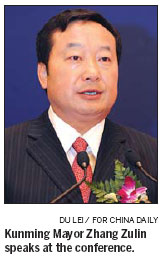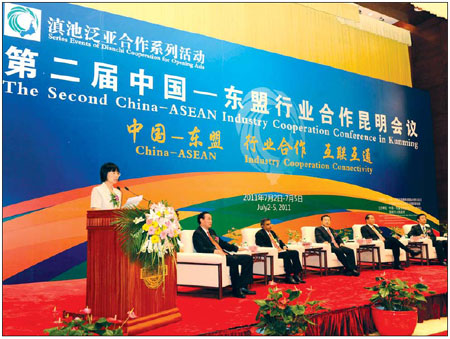News
Turning Kunming into a regional hub
By Zhang Zhao (China Daily)
Updated: 2011-07-05 08:00
 |
Large Medium Small |
|
Delegates from China and abroad talking about better methods for industrial cooperation in the region at the conference. Du Lei / for China Daily |

Business opportunities and market expansion in cross-border trade area
A second conference on innovative approaches to business between China and Southeast Asian nations took place this weekend in Kunming, the capital of Yunnan province, in a search for mutual benefits to be gained from cooperation.
There were around 200 delegates taking part in this second China-Association of Southeast Asian Nations (ASEAN) Industrial Cooperation Conference (CAICC), on July 3.
The theme was "CAFTA - the industrial interconnection" and the purpose was to discuss market expansion and business opportunities in the China-ASEAN Free Trade Area (CAFTA).
One immediate result of the conference was that some trade associations from ASEAN member countries opened offices in Kunming.
Delegates included representatives of the Chinese and Southeast Asian nations' governments, as well as foreign ambassadors, executives of commercial associations, and leading entrepreneurs.
The conference is organized by the China-ASEAN Business Council (CABC), the government of Kunming, the Chinese Ministry of Commerce, and the China Council for the Promotion of International Trade's International Relations Department.
Closer business ties between China and Southeast Asian nations are "very important and needed badly", said Xu Ningning, deputy secretary-general of the CABC, who is also China's top expert on ASEAN business affairs.
"We see it as the key to mutually beneficial results in the free trade area," Xu explained.
"Systematic"
"The business partnership between China and ASEAN is a systematic approach," Xu went on to explain.
"It requires a joint effort by local governments, trade associations and companies and we need a long-term industrial restructuring plan."
Industrial cooperation between China and ASEAN is wide-ranging and includes business information exchanges, greater market access, trade negotiations, training programs, exhibitions, and visits by businesspeople from both regions.
Xu has advocated closer business ties with the Southeast Asian nations for almost a decade and has written many articles pushing the idea.
He said he believes that China-ASEAN business cooperation should be based on a principle of negotiation and innovation that involves mutual benefits and profits.
More than 20 of China's industrial associations had strategic partnerships with the Chinese secretariat of CABC by the end of June.
The first Industrial Cooperation Conference took place in Kunming last September.
At that time, Wan Jifei, chairman of the China International Trade Promotion Committee, suggested that China and ASEAN try to develop new cooperation plans immediately for associations from both regions.
He also called for expanding the areas and forms of cooperation, and improved systems for it.
CAICC, as part of China-ASEAN cooperation idea and the first formal business meeting under CAFTA's aegis, has an important role in helping operations in both regions, said Wan.
Regional hubThe conference's host city is a regional transportation and trade hub, with good access to cross-border trade, as well as China-ASEAN exchanges.
CAFTA was set up on January 1, 2010, and Kunming's trade with ASEAN members was worth $2.24 billion last year, an increase of 51.3 percent from 2009.
In the first five months of this year, it reached $1.22 billion, an increase of 61.6 percent from the same last year period.
The city had six overseas investment projects in 2010, with an agreed capital of more than $70 million. The areas involved include mining, trade center construction work, manufacturing, agriculture, and rubber trees.
According to Zhang Zulin, the mayor of Kunming, the city is now an important part of Yunnan's "gateway strategy" as a regional hub with stronger industries, a better environment, and more trade and investment with ASEAN.
(China Daily 07/05/2011 page24)
| 分享按钮 |
